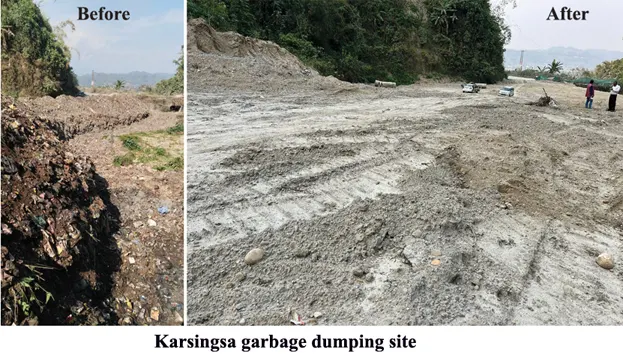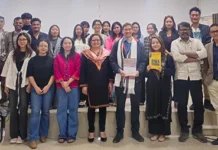[Bengia Ajum]
ITANAGAR, 17 Apr: The Itanagar Smart City Development Corporation Ltd (ISCDCL) has started clearing the dumpsites in Karsingsa and Chimpu in the Itanagar Capital Region, using bio-remediation process.
In the first phase, the Karsingsa dumpsite has been successfully cleared of legacy wastes. The Itanagar Municipal Corporation (IMC) is soon going to construct a vehicle garage at the vacant site.
The total quantity of legacy waste from the Karsingsa dumpsite was 11,730 cubic metres, and that in Chimpu is 32,386.83 cubic metres. Legacy waste is the leftovers generated from combined residential, industrial and commercial activities in a given area. Legacy waste has several ill-effects, like generation of greenhouse gases, pollution of the entire ecosystem around the dumpsite, posing risk of uncontrollable fire, etc.
The Karsingsa dumpsite was used for six years and the government had allotted it to the IMC in 2016. However, the dumping of garbage was stopped from 2019 onwards after the locals protested. The garbage from Naharlagun as well as Banderdewa area is now dumped at Chimpu.
The bio-remediation process is being done at the municipal solid waste (MSW) plant in Chimpu. The machines and other equipment for the process, along with human resource, are in place at the site. Next, the ISCDCL is targeting to clear the legacy wastes at the Chimpu dumpsite. But it continues to face major challenges as garbage is dumped daily and sometimes it is dumped in the areas where legacy waste is being readied for bio-remediation.
“On an average, daily 75 trucks of IMC dump garbage at the Chimpu site. Besides, private parties also dump their wastes. Most of the drivers are not properly trained in how and where to dump the new wastes. The mixing of new wastes with legacy wastes makes it impossible to carry out bio-remediation process. Therefore our work is getting a bit delayed,” said an official of the ISCDCL.
Further, the official raised serious concern over illegal dumping of biomedical wastes by the hospitals and clinics at the dumping site. “The biomedical wastes should be treated at the hospital and clinic itself. It is being dumped recklessly in the open dumping site, posing serious health hazards. The administration should look into it,” the official said.
The MSW plant in Chimpu was inaugurated in 2013 under the aegis of the UD & housing department. The plant was meant for processing of mixed waste, composting and scientific landfill of inert waste. But, due to failure of machinery, the processing of waste could not be continued.
Later, the plant was handed over to the IMC in a defunct state, and it became a dumping site of garbage. The garbage collected from the ICR is dumped near the hilly side of the MSW after the area around it got filled with garbage.
After the removal of legacy waste from the Chimpu site, the area will be converted into a green space by carrying out avenue plantation. The ISCDCL is also in the process of developing a sanitary landfill in Chimpu. The underdeveloped landfill area in Chimpu is being revamped and used for landfilling, using all possible scientific methods. The broad objective of the project is to remediate and reclaim the dumpsites, create a green belt, reuse the restored areas, and recycle the waste material and other resources.
Solid waste management has become a major issue in the state. In November 2022, the National Green Tribunal (NGT) imposed a penalty of Rs 1 lakh per month on the IMC for the lack of a solid waste management plant in the state capital. Also, in August 2021, the State Pollution Control Board imposed penalties on the IMC and the Pasighat Municipal Council for failing to comply with the NGT’s order issued on 28 February, 2020 regarding legacy waste remediation and sewage treatment plant.






